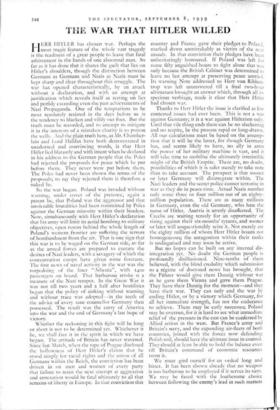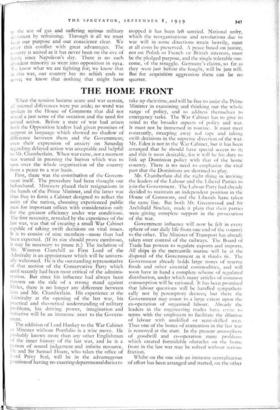THE WAR THAT HITLER WILLED
HERR HITLER has chosen war. Perhaps the most tragic feature of the whole vast tragedy is the readiness of a great people to leave that fatal arbitrament in the hands of one abnormal man. So far as it has done that it shares the guilt that lies on Hitler's shoulders, though the distinction between Germans as Germans and Nazis as Nazis must be kept sharp and clear throughout this struggle. The war has opened characteristically, by an attack without a declaration, and with an attempt at justification which reveals itself as resting on lies and perfidy exceeding even the past achievements of Nazi Propaganda. One of the temptations to be most resolutely resisted in the days before us is the tendency to blacken and vilify our foes. But the truth must be recorded, and to attempt to mitigate it in the interests of a mistaken charity is to poison the wells. And the plain truth here, as Mr. Chamberlain and Lord Halifax have both demonstrated in unadorned and convincing words, is that FIerr Hitler lied blatantly and with intent when he declared in his address to the German people that the Poles had rejected the proposals for peace which he put before them. They never were put before them. The Poles had never been shown the terms of the proposals; to say they rejected them is therefore a naked lie.
So the war began. Poland was invaded without warning, under cover of the pretence, again a patent lie, that Poland was the aggressor and that intolerable brutalities had been committed by Poles against the German minority within their borders. Now, simultaneously with Herr Hitler's declaration that his army will limit its aerial bombing to military objectives, open towns behind the whole length of Poland's western frontier are suffering the terrors of bombardment from the air. That is one sign that this war is to be waged on the German side, so far as the armed forces are prepared to execute the desires of Nazi leaders, with a savagery of which the concentration camps have given some foretaste. The first news of naval activity in the war was the iorpedoing of the liner "Athenia", with 1400 passengers on board. That barbarous stroke is a measure of the Nazi temper. In the Great War it was not till two years and a half after hostilities began that the policy of sinking without warning and without trace was adopted—in the teeth of the advice of every sane counsellor Germany then possessed. The result was the entry of America into the war and the end of Germany's last hope of victory. Whether the reckoning in this fight will be long or short is not to be determined yet. Whichever it be, we shall face it in the spirit in which we have begun. The attitude of Britain has never wavered. Since last March, when the rape of Prague disclosed the hollowness of Herr Hitler's claims that he stood simply for racial rights and the union of all Germans within the Reich, the conviction has been driven in on men and women of every party that failure to resist the next attempt at aggression and annexation would be fatal ultimately to all that remains of liberty in Europe. In that conviction this country and France gave their pledges to Poland, marked down unmistakably as victim of the next assault. In that conviction their pledges have been
unhesitatingly honoured. If Poland was left for some fifty anguished hours to fight alone that was only because the British Cabinet was determined to leave no last attempt at preserving peace untried. Its warning Note addressed to Herr von Ribbentrop was left unanswered till a final two-hour ultimatum brought an answer which, through all its specious verbiage, made it clear that Herr Hitler had chosen war.
Thanks to Herr Hitler the issue is clarified as few contested issues had ever been. This is not a war against Germany; it is a war against Hitlerism only. Until that vile thing ends there can be no slackening and no respite, be the process rapid or long-drawn. All our calculations must be based on the assumption that it will be the latter, for though Germans' has, and seems likely to have, no ally in arms the power of her military machine is vast, and it will take time to mobilise the ultimately irresistible might of the British Empire. There are, no doubt, possibilities of which it is safer merely to take note than to take account. The prospect is that sooner or later Germany will disintegrate within. The Nazi leaders and the secret police cannot terrorise in war as they do in peace-time. Actual Nazis number only some three or four million out of an eightymillion population. There are as many millions in Germany, even the old Germany, who hate the name of Hitler. Austria is utterly disaffected. The Czechs are waiting tensely for an opportunity of rising against their six-months' tyrants, and sooner or later will unquestionably seize it. Not merely are the eighty million of whom Herr Hitler boasts not homogeneous; the antagonism within their ranks is undisguised and may soon be active.
But no hopes can be built on any internal dis integration yet. No doubt the German people is profoundly disillusioned. Nine-tenths of them believed, with the blind credulity which submission to a regime of doctored news has brought, that the Fiihrer would give them Danzig without war as he gave them Vienna and gave them Prague. They have their Danzig for the moment—and they have their war. They can only end the war by ending Hitler, or by a victory which Germany, for all her immediate strength, has not the endurance to achieve. There may be early successes; Poland may be overrun, for it is hard to see what immediate relief of the pressure in the east can be conferred by Allied action in the west. But France's army and Britain's navy, and the expanding air-fleets of both countries, joined with the forces now defending Polish soil, should have the ultimate issue in control. They should at least be able to hold the balance even till Britain's command of economic resources turns it.
We must gird ourself for an ordeal long and bitter. It has been shown already that no weapon is too barbarous to be employed if it serves its turn. We may be faced with the loathesome choice between following the enemy's lead in such matters
as the use of gas and suffering serious military dciriment by refraining. Through it all we must kp our purpose and Our conscience clear. We enter this conflict with great advantages. The country is united as it has never been on the eve of battle since Napoleon's day. There is no such dissident minority as went into opposition in 1914. We know what we are fighting for; we know that in this war, our country has no selfish ends to serve; we know that nothing that might have
stopped it has been left untried. National unity, which the reorganisations and revolutions due to war will in some directions strain heavily, must at all costs be preserved. A peace based on justice, not on Polish or French or British interests, must be the pledged purpose, and the single tolerable outcome, of the struggle. Germany's claims, so far as they were just before she fought, will be just still. But for acquisitive aggression there can be no quarter.























 Previous page
Previous page